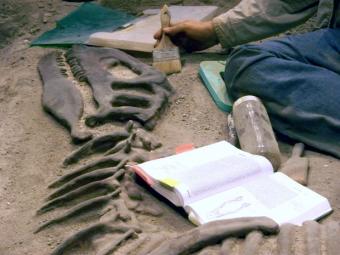
A science encyclopedia for kids provides an easy way to reference information, look up new facts, research for school projects and help kids learn in general. Science encyclopedias and related reference books can be great supplementary aids for Internet research and they are fun for kids who are looking for ways to learn more about science.
Science Encyclopedias for Kids
Before choosing a science encyclopedia, it might be wise to take a trip to the local library or bookstore with your child so that he or she can page through volumes and see which ones are most appealing, and which ones could help most with schoolwork. A picture encyclopedia may be the best choice for young children. Elementary school or middle school kids who enjoy reading can often benefit from science encyclopedias meant for older children or adults, as they'll be able to use them for many years.
Encyclopedia Choices
Most of these science encyclopedias are designed for kids and cover a wide range of topics through clear writing and simple formatting.
Encyclopedia of Science: This 450-page volume from DK Publishing is meant for kids between the ages of 9 and 12. Among other topics, it has accessible information about chemistry, animal biology, physics, natural science, and scientific history. It's a worthwhile resource for school reports and science projects, but facts about specific branches of science, such as microbiology, are likely easier for kids to find online.
The Kingfisher Science Encyclopedia: Originally published in 2000, the Kingfisher encyclopedia is updated every few years to reflect new information, discoveries, technological advancements, and knowledge. The book is approximately 500 pages and very visual, with dozens of charts, graphs, diagrams, photographs and illustrations to explain concepts clearly. Human biology, conservation and the environment, and astronomy are all covered in the encyclopedia, which is meant for upper elementary and middle school kids. The basic information is solid and helpful, but as with the Encyclopedia of Science, kids may need to look elsewhere if they seek in-depth facts and detail about a special topic or scientific branch.
The Usborne Science Encyclopedia: Recognizing that kids' reference books can no longer compete with the Web, the Usborne volume has a handy section of recommended Internet sites that might help kids with further research. It's designed for advanced elementary and middle school students, as the language is more complex and the explanations more complicated than those in the Kingfisher and DK Publishing survey encyclopedias. The depth and breadth of information available in the book also makes it a useful resource for homeschoolers.
First Science Encyclopedia: Also from DK Publishing, the First Science Encyclopedia is geared toward younger kids and aims to spark an early interest in science and the natural world. The book weighs in at 128 pages and is a light companion to the more comprehensive Encyclopedia of Science. Some of the concepts may be beyond the grasp of the very young, but early elementary school kids should be able to latch on to most of the information and understand the descriptions and facts with parents' help.
Visual Encyclopedia of Science: Sometimes, huge blocks of text can be intimidating to kids who aren't confident in their reading skills or don't always get good grades in school. For reluctant readers and visual learners, the Visual Encyclopedia of Science is a truly useful tool. The tome is just as heavy and comprehensive as comparable volumes, at just over 500 pages, but the graphs, charts, illustrations, and other visuals are a cut above the rest and an exemplary resource for conveying information.
The Encyclopedia of Science and Technology: For high school aged kids and precocious middle schoolers, the Routledge volume is a high-end research tool that covers multiple branches of physical science, life science, and technology. The information is well organized and indexed, making any topic easy to find, and seriously complex topics such as the origin of the universe and the specifics of DNA are clearly and concisely covered.
Where to Buy
Science encyclopedias for kids are typically available in the children's reference sections of both independent and chain bookstores. If you're seeking a specific title that isn't in stock, a store may be able to order it for you. For the widest selection and price variation, search online markets, virtual used and secondhand bookstores, and auction sites.







